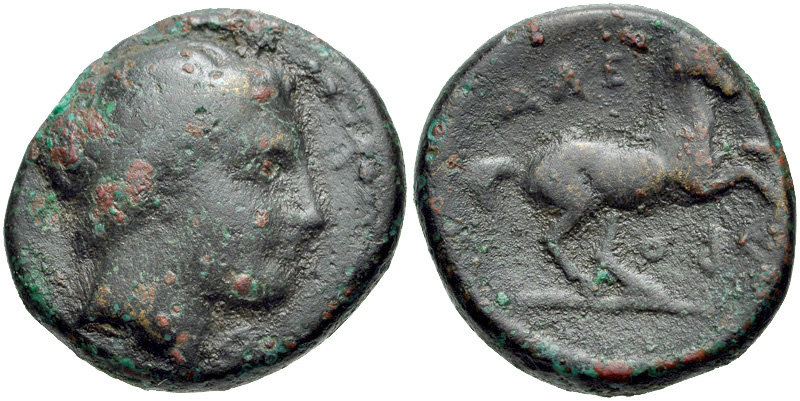1. Overview

Alexander II (ἈλέξανδροςAlexandrosGreek, Ancient; c. 390-368 BC) was a king of the Ancient Greek kingdom of Macedon, reigning from approximately 370 BC until his death in 368 BC. A member of the Argead dynasty, he was the eldest son of Amyntas III of Macedon and Eurydice I of Macedon. His brief reign was marked by significant internal and external challenges, including invasions from the Illyrians and the pretender Pausanias, as well as complex diplomatic and military interventions in Thessaly. His rule saw a crucial shift in Macedonian alliances from Athens to Thebes, and he was ultimately assassinated, leading to a period of regency under Ptolemy of Aloros. This section sets the stage for the full article, providing a balanced historical overview of his life and rule within the context of ancient Greece.
2. Family
Alexander II was the eldest of three sons born to Amyntas III of Macedon, the King of Macedon, and Queen Eurydice I. Both his parents were prominent figures within the Argead dynasty, which ruled Macedon. His younger brothers were Philip II of Macedon, who would later become one of Macedon's most famous kings, and Perdiccas III of Macedon, who succeeded Alexander II to the throne.
3. Reign
Alexander II's reign as King of Macedon was short but eventful, characterized by immediate threats upon his accession and intricate political and military engagements in the wider Greek world.
3.1. Accession and Early Challenges
Alexander II ascended to the throne around 370 BC following the death of his father, Amyntas III of Macedon. Although he had reached his majority, he was still very young, which immediately presented problems for the new king as various enemies of the Argead dynasty resumed hostilities against Macedon. From the northwest, Macedon faced an Illyrian invasion, while simultaneously, a pretender named Pausanias launched an attack from the east. Pausanias quickly seized control of several cities and posed a direct threat to the queen mother, Eurydice I of Macedon, who was residing at the royal palace in Pella with her younger sons. Alexander II successfully repelled these enemies with the crucial assistance of the Athenian general Iphicrates. Iphicrates, who was sailing along the Macedonian coast en route to recapture Amphipolis, provided timely aid that allowed Alexander to secure his initial hold on the throne.
3.2. Military Intervention and Alliances
Following these early successes, Alexander II became involved in the internal affairs of Thessaly. At the request of the Thessalian Aleuadae family, he intervened in a civil war plaguing the region. His intervention proved successful, as he managed to gain control of Larissa and several other Thessalian cities. However, Alexander II then betrayed an earlier promise by establishing Macedonian garrisons in these cities, which provoked a strong and hostile reaction from Thebes. At the time, Thebes was the dominant military power in Ancient Greece, and they viewed Alexander's actions as a breach of trust and an unwelcome expansion of Macedonian influence.
3.3. Thessalian Campaign and Diplomatic Repercussions
The Theban response to Alexander II's actions in Thessaly was swift and decisive. The Theban general Pelopidas led a campaign that successfully expelled the Macedonian forces from Thessaly. Pelopidas then strategically undermined Alexander's position by supporting the ambitions of Ptolemy of Aloros, who was Alexander's brother-in-law. This diplomatic pressure forced Alexander II to abandon his alliance with Athens and instead align Macedon with Thebes. As a condition of this new alliance, Alexander was compelled to hand over several prominent hostages to Thebes, including his younger brother, the future Philip II of Macedon. This event marked a significant shift in Macedonian foreign policy and demonstrated Theban hegemony in the region.
3.4. Political Maneuvering and Assassination
During his reign, Alexander II also introduced a significant military innovation: he coined the name for the king's personal guard, the `ΠεζέταιροιPezhetairoiGreek, Ancient`, meaning "infantry companions." This term would later be re-adapted and famously used by his brother, Philip II of Macedon, to refer to his elite pike infantry. Alexander II's political maneuvering, particularly the forced alliance with Thebes, created internal tensions. In 368 BC, his brief reign came to an abrupt end when he was assassinated during a performance of the telesias, a traditional war dance. The assassination was orchestrated and instigated by Ptolemy of Aloros, the very brother-in-law whose ambitions Thebes had supported to neutralize Alexander's influence.
4. Succession and Regency
Following the assassination of Alexander II in 368 BC, the succession passed to his younger brother, Perdiccas III of Macedon. However, Perdiccas was still underage at the time, which necessitated the establishment of a regency. Ptolemy of Aloros, the orchestrator of Alexander's death, was appointed as regent, effectively becoming the de facto ruler of Macedon. This period of regency under Ptolemy marked a continuation of the instability that characterized Alexander II's brief time on the throne.
5. Historical Assessment

Alexander II's reign, though remarkably short from approximately 370 to 368 BC, was a period of significant volatility for the Ancient Greek kingdom of Macedon. He faced immediate and severe challenges upon his accession, including invasions and internal pretenders, which he managed to overcome with external aid. His intervention in Thessaly, however, demonstrated a lack of diplomatic foresight, leading to a direct confrontation with the dominant power of Thebes. The forced shift in alliances and the cession of his brother Philip as a hostage underscored Macedon's subordinate position to Theban influence at the time. His assassination by Ptolemy of Aloros highlights the intense internal power struggles within the Argead dynasty. Despite the brevity and turbulent nature of his rule, Alexander II's reign is notable for the formal naming of the `ΠεζέταιροιPezhetairoiGreek, Ancient`, a military unit that would later become a cornerstone of Macedonian military might under his more famous brother, Philip II of Macedon. His death plunged Macedon into further instability, setting the stage for the rise of his remarkable younger brother.
6. External links
- [http://www.american-pictures.com/genealogy/persons/per01441.htm Ancestry of Alexander II]
- [http://www.macedonia.com/english/history/ History of Macedonia]